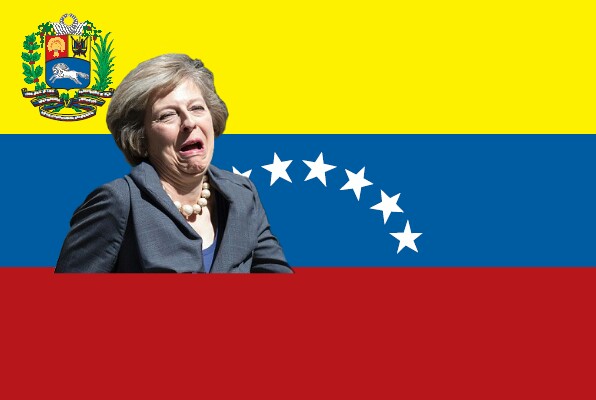Tories whilst criticising Corbyn over Venezuela were selling them weapons
Theresa May urged to suspend controlled export licences to Venezuelan government while violent clashes continue.
Britain has sold military equipment worth millions of pounds to Venezuela in the last decade, it has emerged, prompting calls for Theresa May to suspend controlled export licences while the country in is the grip of violent clashes between police and protesters.
Government figures show military equipment was approved for sale from UK-based companies to Venezuela’s armed forces as recently as September last year, despite the Foreign Office listing the country as “of concern” regarding human rights.
Overall, £2.5m of military goods have been sold to the country since 2008, including components for military radar, weapon sights and military aircraft engines. In the last year of figures, to March 2016, licences for goods worth more than £80,000 were approved, including equipment for crowd control to be used by law enforcement agencies.
The revelations will prompt questions about why the government continues to allow arms sales to countries the Foreign Office lists as having a poor human rights record, from Venezuela to Saudi Arabia.
No 10 has repeatedly criticised Nicolás Maduro’s government for imprisoning opposition leaders. It described the death of at least 120 protesters as a tragedy, and called on the country to respect human rights and uphold the rule of law.
Some senior Conservatives have attacked the Labour leader, Jeremy Corbyn, for condemning violence on all sides but stopping short of specifically criticising the Maduro government.
Jo Swinson, the Liberal Democrats deputy leader, said it “smacks of double standards for the Tories to attack the Labour leadership for supporting Venezuela whilst selling arms and security equipment to dictators and regimes with even worse human rights records.
“The Conservatives have rightly hailed the importance of supporting human rights and democracy in Venezuela. But they seem to find it irrelevant when it comes to selling billions of pounds of weapons to Saudi Arabia, which executed 153 people by beheading in 2016 and is indiscriminately bombing civilians in Yemen. In the past two years, the Conservative government has even continued selling security equipment to Venezuela.
“Both parties should stop playing politics with human rights and realise that these values are universal. I hope all MPs will support our call for presumption of denial, meaning a blanket ban on licences to countries which abuse human rights unless there is explicit ministerial sign-off.”
The Lib Dems highlighted £1.2bn of sales of UK military equipment to entities in countries on the government’s human rights concern list in the last year, including £300m to Saudi Arabia, £250m to China, £191m to Russia, £8.8m to Egypt and £3.6m to Turkmenistan.
Andrew Smith, from Campaign Against the Arms Trade, said: “These licences should never have been agreed in the first place, particularly not considering Venezuela is on the UK government’s own countries of concern list for human rights and democracy.”
CAAT pointed to a higher total of £4.1bn of military equipment going to 22 of the 30 countries on the human rights list of concern since the Conservative government came to power in 2015.
A spokeswoman for the Department for International Trade said: “The government takes its export control responsibilities extremely seriously and operates one of the most robust defence export control regimes in the world.
“We rigorously examine every application on a case-by-case basis against the consolidated EU and national arms export licensing criteria and a licence will not be issued, to any destination, if to do so would be inconsistent with this criteria.
“Our export licensing system allows us to respond quickly to changing facts on the ground. We have suspended or revoked licences when the level of risk changes and we constantly review local situations.”
The government says it does not export equipment when it assesses there is a clear risk that it might be used for internal repression or would provoke or prolong conflict in a country, or where there is a clear risk that the intended recipient would use the items aggressively against another country.


